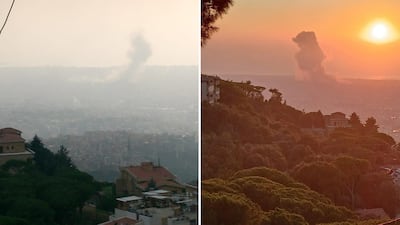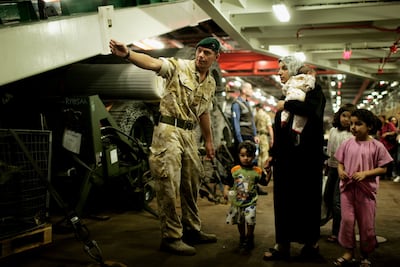Live updates: Follow the latest from Israel-Gaza
It was my grandmother who called the British embassy to register our names for evacuation from Beirut in 2006. My mum had said she would not leave her or Lebanon, despite the relentless Israeli bombing.
Today, my family faces similar questions once more, as the UK evacuates citizens from Lebanon on chartered flights.
We arrived in Beirut on July 12, 2006, the day that Hezbollah infiltrated the Israeli border, kidnapped two soldiers and killed three others. Israel retaliated that day by bombing bridges in the south of Lebanon.
My dad predicted the bombing would be over by the afternoon, and dropped my mum, brother and I off at the airport for our annual summer holiday. There were television crews on the flight with us to Beirut – a sign that others were thinking differently. Israel bombed the airport a few hours after we arrived, and I was woken by the sound of an explosion.
Israel ran out of targets quickly in 2006, then it carpet-bombed Beirut and the south of Lebanon, killing more than 1,100 people – more than three quarters of them civilians, according to Amnesty International.
The constant drone of planes overhead, the explosions that could be seen from our balcony in the mountains, then heard across the mountains, the sound barrier being broken repeatedly, took a toll on us very quickly.
Although the area we lived in was safe from the war, there were daily reports of shelling and civilians being hit. We saw cars packed with families fleeing the south, their suitcases bulging in the boot and their mattresses tied to the roof.
A couple of days after we were registered to be evacuated, the embassy told us to go to Beirut port the next morning. This was around a week into the war. Two other children, my friend Toufic, and our neighbour’s son George, were picked up on the way. Like us, they had come to Lebanon from the UK to see their grandparents.
The British Army had taken over a large hangar by the port to process about 4,500 people for evacuation – British nationals, dual nationals, and non-nationals travelling with British family – and get them on to Royal Navy ships that would take us to Cyprus. It was a sunny morning with a breeze, and the sounds of the war were not as intense here as in the mountains – even though we were much closer to it.
My brother, 15 then, was disappointed we would not be taken by air to the warships as others had been owing to an Israeli naval blockade on Beirut port. He told us in great detail about the ships we were likely to travel in, and about the newly commissioned assault ship HMS Bulwark.
We spent the day in the hangar, waiting to board the destroyer HMS York, which would take an overnight journey to Limassol in Cyprus. Some of the children we had met there, who were fleeing the south, were leaving the country for the first time. The 300km journey would take more than 12 hours, as the warships were required by the Israeli military to use a defined route.
We all went up to the deck when the ship left, to have a last look at Beirut. I felt sad and guilty leaving, not knowing when we would come back, and what Beirut would look like when we did. We slept – or tried to sleep – on the floor in one of the ship’s offices, curled under a desk, or making s-shapes with our bodies around a chair. The boys ate from a soldier’s ration packs.
When we arrived at Limassol, a group of women from an army wives association were serving tea and what seemed like an endless supply of Bourbon and Nice biscuits. There were also priests and psychologists ready to speak to people in need of support.
I distinctly remember how impressed we all were by the navy officers. They seemed to be always smiling, so patient with us and kind. They brought order to the chaos of our situation. We flew to London on another overnight flight, after another very long day of waiting.
Confusion, but success
The operation was praised after it ended, and is today still thought of as a success. “No nation could have got there more quickly or done it more professionally than we did,” former admiral Bob Cooling, who was captain of one of the warships that took people out of Lebanon, said at the time.
However, local authorities in the UK complained they were kept in the dark, according to official documents. “Central government was unprepared, with no lead government department and no national plan for managing the UK reception of a non-combatant evacuation operation,” said another document by the now-defunct Government Office for the South East.
“The information coming out of the Foreign Office was confused and there was a clear lack of internal communication within it. Despite repeated prompting they failed to make full use of the Ministry of Defence staff in Cyprus to obtain urgently the information required by local responders in the UK,” the document said.
“It was not known until a short time before the aircraft landed exactly how many people were on board. The only information available was the type and capacity of the aircraft,” said a Leicestershire County Council document.
The council also pointed out the limitations of such plans. “Many of the staff involved in this operation worked throughout the whole weekend and beyond and would not have been able to maintain a sustained commitment,” it said.
Action plan
The situation for British citizens in Lebanon today feels a lot less certain. In a grand gesture, the UK sent 700 troops to Cyprus last month to prepare for an evacuation, hinting at a re-run of Operation Highbrow, as the events of 2006 came to be known.
But then it quietly chose a more limited option. About 55 British people were given seats on the few remaining commercial flights out of Lebanon since Sunday. While a flight was chartered, Foreign Secretary David Lammy said on Monday there may not be other evacuations. “It is vital that you leave now as further evacuation may not be guaranteed” he said.
The chartered flight from Beirut to Birmingham took off on Wednesday, and the government now says more are planned. Evacuees paid £350 per seat on the plane to Birmingham, in addition to travel costs back home. A separate scheduled Middle East Airlines service also took Britons back to the UK.
“The first charter flight taking British nationals out of Lebanon has now departed. We have arranged another flight for tomorrow, and further flights over the coming days for as long as there is demand and it is safe to do so,” said Mr Lammy on Wednesday:
But there are concerns in Whitehall that further military activity by Israel could result in the closure of the airport, cutting off the most straightforward exit route for the estimated 4,000 to 6,000 British in Lebanon.
The airport and the suburbs leading to it remain a target, making the short journey there a dangerous one. Few people will opt to travel through Damascus, as they had done in 2006, because of the dangers of being in Syria.
People arriving to London from Beirut on Tuesday spoke of these challenges, and their feeling of abandonment by the UK. One British Lebanese mother, Solange, said she wanted to go back to Lebanon and help with humanitarian efforts when she could.
How we think of borders, migrants and refugees in Europe has also changed since 2006. Many British nationals remaining in Lebanon now are taking care of the elderly or more vulnerable family, for whom they will be unable to get visas to the UK. Some will opt for Schengen visas instead, will join family in the Gulf, or simply stay put.
The war in 2006 marked a turning point for Israel. Though it had the military advantage, it lost the sympathy of many of its allies, and control over the conflict’s narrative. Hezbollah was not removed, but strengthened by that war, leading to the conflict that we see today.
It is hard to leave your country when it is at war, even when the dangers are immense, or if you have another home elsewhere. Despite their political differences, the Lebanese come together in times of crisis, helping those displaced by the war, both in 2006 and again today – a reminder of the unity in a country often described as fractured and sectarian.
Veere di Wedding
Dir: Shashanka Ghosh
Starring: Kareena Kapoo-Khan, Sonam Kapoor, Swara Bhaskar and Shikha Talsania
Verdict: 4 Stars
UAE currency: the story behind the money in your pockets
UK-EU trade at a glance
EU fishing vessels guaranteed access to UK waters for 12 years
Co-operation on security initiatives and procurement of defence products
Youth experience scheme to work, study or volunteer in UK and EU countries
Smoother border management with use of e-gates
Cutting red tape on import and export of food
Tonight's Chat on The National
Tonight's Chat is a series of online conversations on The National. The series features a diverse range of celebrities, politicians and business leaders from around the Arab world.
Tonight’s Chat host Ricardo Karam is a renowned author and broadcaster who has previously interviewed Bill Gates, Carlos Ghosn, Andre Agassi and the late Zaha Hadid, among others.
Intellectually curious and thought-provoking, Tonight’s Chat moves the conversation forward.
Facebook | Our website | Instagram
Tips to stay safe during hot weather
- Stay hydrated: Drink plenty of fluids, especially water. Avoid alcohol and caffeine, which can increase dehydration.
- Seek cool environments: Use air conditioning, fans, or visit community spaces with climate control.
- Limit outdoor activities: Avoid strenuous activity during peak heat. If outside, seek shade and wear a wide-brimmed hat.
- Dress appropriately: Wear lightweight, loose and light-coloured clothing to facilitate heat loss.
- Check on vulnerable people: Regularly check in on elderly neighbours, young children and those with health conditions.
- Home adaptations: Use blinds or curtains to block sunlight, avoid using ovens or stoves, and ventilate living spaces during cooler hours.
- Recognise heat illness: Learn the signs of heat exhaustion and heat stroke (dizziness, confusion, rapid pulse, nausea), and seek medical attention if symptoms occur.
BULKWHIZ PROFILE
Date started: February 2017
Founders: Amira Rashad (CEO), Yusuf Saber (CTO), Mahmoud Sayedahmed (adviser), Reda Bouraoui (adviser)
Based: Dubai, UAE
Sector: E-commerce
Size: 50 employees
Funding: approximately $6m
Investors: Beco Capital, Enabling Future and Wain in the UAE; China's MSA Capital; 500 Startups; Faith Capital and Savour Ventures in Kuwait
The%C2%A0specs%20
%3Cp%3E%3Cstrong%3EEngine%3A%20%3C%2Fstrong%3E3.5-litre%2C%20twin-turbo%20V6%0D%3Cbr%3E%3Cstrong%3ETransmission%3A%20%3C%2Fstrong%3E10-speed%20auto%0D%3Cbr%3E%3Cstrong%3EPower%3A%20%3C%2Fstrong%3E410hp%0D%3Cbr%3E%3Cstrong%3ETorque%3A%20%3C%2Fstrong%3E495Nm%0D%3Cbr%3E%3Cstrong%3EPrice%3A%20%3C%2Fstrong%3Estarts%20from%20Dh495%2C000%20(Dh610%2C000%20for%20the%20F-Sport%20launch%20edition%20tested)%0D%3Cbr%3E%3Cstrong%3EOn%20sale%3A%20%3C%2Fstrong%3Enow%3C%2Fp%3E%0A
Abaya trends
The utilitarian robe held dear by Arab women is undergoing a change that reveals it as an elegant and graceful garment available in a range of colours and fabrics, while retaining its traditional appeal.
Killing of Qassem Suleimani
Killing of Qassem Suleimani
WOMAN AND CHILD
Director: Saeed Roustaee
Starring: Parinaz Izadyar, Payman Maadi
Rating: 4/5
Tank warfare
Lt Gen Erik Petersen, deputy chief of programs, US Army, has argued it took a “three decade holiday” on modernising tanks.
“There clearly remains a significant armoured heavy ground manoeuvre threat in this world and maintaining a world class armoured force is absolutely vital,” the general said in London last week.
“We are developing next generation capabilities to compete with and deter adversaries to prevent opportunism or miscalculation, and, if necessary, defeat any foe decisively.”
THE SPECS
Touareg Highline
Engine: 3.0-litre, V6
Transmission: 8-speed automatic
Power: 340hp
Torque: 450Nm
Price: Dh239,312
The%20specs
%3Cp%3E%3Cstrong%3EEngine%3A%20%3C%2Fstrong%3E3.6-litre%2C%20V6%0D%3Cbr%3E%3Cstrong%3ETransmission%3A%20%3C%2Fstrong%3Eeight-speed%20auto%0D%3Cbr%3E%3Cstrong%3EPower%3A%20%3C%2Fstrong%3E285hp%0D%3Cbr%3E%3Cstrong%3ETorque%3A%20%3C%2Fstrong%3E353Nm%0D%3Cbr%3E%3Cstrong%3EPrice%3A%20%3C%2Fstrong%3EDh159%2C900%0D%3Cbr%3E%3Cstrong%3EOn%20sale%3A%20%3C%2Fstrong%3Enow%3C%2Fp%3E%0A
The%20Specs%20
%3Cp%3E%3Cstrong%3ELamborghini%20LM002%3C%2Fstrong%3E%3Cbr%3E%3Cstrong%3EEngine%3A%3C%2Fstrong%3E%205.2-litre%20V12%3Cbr%3E%3Cstrong%3EPower%3A%3C%2Fstrong%3E%20450hp%20at%206%2C800rpm%3Cbr%3E%3Cstrong%3ETorque%3A%20%3C%2Fstrong%3E500Nm%20at%204%2C500rpm%3Cbr%3E%3Cstrong%3ETransmission%3A%20%3C%2Fstrong%3EFive-speed%20manual%3Cbr%3E%3Cstrong%3E0-100kph%3A%3C%2Fstrong%3E%209%20seconds%20(approx)%3Cbr%3E%3Cstrong%3ETop%20speed%3A%3C%2Fstrong%3E%20210kph%20(approx)%3Cbr%3E%3Cstrong%3EYears%20built%3A%3C%2Fstrong%3E%201986-93%3Cbr%3E%3Cstrong%3ETotal%20vehicles%20built%3A%3C%2Fstrong%3E%20328%3Cbr%3E%3Cstrong%3EValue%20today%3A%3C%2Fstrong%3E%20%24300%2C000%2B%3Cbr%3E%3C%2Fp%3E%0A
The specs
Engine: 6.2-litre supercharged V8
Power: 712hp at 6,100rpm
Torque: 881Nm at 4,800rpm
Transmission: 8-speed auto
Fuel consumption: 19.6 l/100km
Price: Dh380,000
On sale: now
The specs
- Engine: 3.9-litre twin-turbo V8
- Power: 640hp
- Torque: 760nm
- On sale: 2026
- Price: Not announced yet
The specs
Engine: 2.0-litre 4cyl turbo
Power: 261hp at 5,500rpm
Torque: 405Nm at 1,750-3,500rpm
Transmission: 9-speed auto
Fuel consumption: 6.9L/100km
On sale: Now
Price: From Dh117,059
ESSENTIALS
The flights
Emirates flies from Dubai to Phnom Penh via Yangon from Dh2,700 return including taxes. Cambodia Bayon Airlines and Cambodia Angkor Air offer return flights from Phnom Penh to Siem Reap from Dh250 return including taxes. The flight takes about 45 minutes.
The hotels
Rooms at the Raffles Le Royal in Phnom Penh cost from $225 (Dh826) per night including taxes. Rooms at the Grand Hotel d'Angkor cost from $261 (Dh960) per night including taxes.
The tours
A cyclo architecture tour of Phnom Penh costs from $20 (Dh75) per person for about three hours, with Khmer Architecture Tours. Tailor-made tours of all of Cambodia, or sites like Angkor alone, can be arranged by About Asia Travel. Emirates Holidays also offers packages.
Four reasons global stock markets are falling right now
There are many factors worrying investors right now and triggering a rush out of stock markets. Here are four of the biggest:
1. Rising US interest rates
The US Federal Reserve has increased interest rates three times this year in a bid to prevent its buoyant economy from overheating. They now stand at between 2 and 2.25 per cent and markets are pencilling in three more rises next year.
Kim Catechis, manager of the Legg Mason Martin Currie Global Emerging Markets Fund, says US inflation is rising and the Fed will continue to raise rates in 2019. “With inflationary pressures growing, an increasing number of corporates are guiding profitability expectations downwards for 2018 and 2019, citing the negative impact of rising costs.”
At the same time as rates are rising, central bankers in the US and Europe have been ending quantitative easing, bringing the era of cheap money to an end.
2. Stronger dollar
High US rates have driven up the value of the dollar and bond yields, and this is putting pressure on emerging market countries that took advantage of low interest rates to run up trillions in dollar-denominated debt. They have also suffered capital outflows as international investors have switched to the US, driving markets lower. Omar Negyal, portfolio manager of the JP Morgan Global Emerging Markets Income Trust, says this looks like a buying opportunity. “Despite short-term volatility we remain positive about long-term prospects and profitability for emerging markets.”
3. Global trade war
Ritu Vohora, investment director at fund manager M&G, says markets fear that US President Donald Trump’s spat with China will escalate into a full-blown global trade war, with both sides suffering. “The US economy is robust enough to absorb higher input costs now, but this may not be the case as tariffs escalate. However, with a host of factors hitting investor sentiment, this is becoming a stock picker’s market.”
4. Eurozone uncertainty
Europe faces two challenges right now in the shape of Brexit and the new populist government in eurozone member Italy.
Chris Beauchamp, chief market analyst at IG, which has offices in Dubai, says the stand-off between between Rome and Brussels threatens to become much more serious. "As with Brexit, neither side appears willing to step back from the edge, threatening more trouble down the line.”
The European economy may also be slowing, Mr Beauchamp warns. “A four-year low in eurozone manufacturing confidence highlights the fact that producers see a bumpy road ahead, with US-EU trade talks remaining a major question-mark for exporters.”
Keep it fun and engaging
Stuart Ritchie, director of wealth advice at AES International, says children cannot learn something overnight, so it helps to have a fun routine that keeps them engaged and interested.
“I explain to my daughter that the money I draw from an ATM or the money on my bank card doesn’t just magically appear – it’s money I have earned from my job. I show her how this works by giving her little chores around the house so she can earn pocket money,” says Mr Ritchie.
His daughter is allowed to spend half of her pocket money, while the other half goes into a bank account. When this money hits a certain milestone, Mr Ritchie rewards his daughter with a small lump sum.
He also recommends books that teach the importance of money management for children, such as The Squirrel Manifesto by Ric Edelman and Jean Edelman.
The specs
Engine: 2.0-litre 4-cyl turbo
Power: 201hp at 5,200rpm
Torque: 320Nm at 1,750-4,000rpm
Transmission: 6-speed auto
Fuel consumption: 8.7L/100km
Price: Dh133,900
On sale: now
The five pillars of Islam
COMPANY%20PROFILE
%3Cp%3E%3Cstrong%3EName%3A%20%3C%2Fstrong%3ESmartCrowd%0D%3Cbr%3E%3Cstrong%3EStarted%3A%20%3C%2Fstrong%3E2018%0D%3Cbr%3E%3Cstrong%3EFounder%3A%20%3C%2Fstrong%3ESiddiq%20Farid%20and%20Musfique%20Ahmed%0D%3Cbr%3E%3Cstrong%3EBased%3A%20%3C%2Fstrong%3EDubai%0D%3Cbr%3E%3Cstrong%3ESector%3A%20%3C%2Fstrong%3EFinTech%20%2F%20PropTech%0D%3Cbr%3E%3Cstrong%3EInitial%20investment%3A%20%3C%2Fstrong%3E%24650%2C000%0D%3Cbr%3E%3Cstrong%3ECurrent%20number%20of%20staff%3A%3C%2Fstrong%3E%2035%0D%3Cbr%3E%3Cstrong%3EInvestment%20stage%3A%20%3C%2Fstrong%3ESeries%20A%0D%3Cbr%3E%3Cstrong%3EInvestors%3A%20%3C%2Fstrong%3EVarious%20institutional%20investors%20and%20notable%20angel%20investors%20(500%20MENA%2C%20Shurooq%2C%20Mada%2C%20Seedstar%2C%20Tricap)%3C%2Fp%3E%0A
MOUNTAINHEAD REVIEW
Starring: Ramy Youssef, Steve Carell, Jason Schwartzman
Director: Jesse Armstrong
Rating: 3.5/5
More from Neighbourhood Watch:
More from Janine di Giovanni









